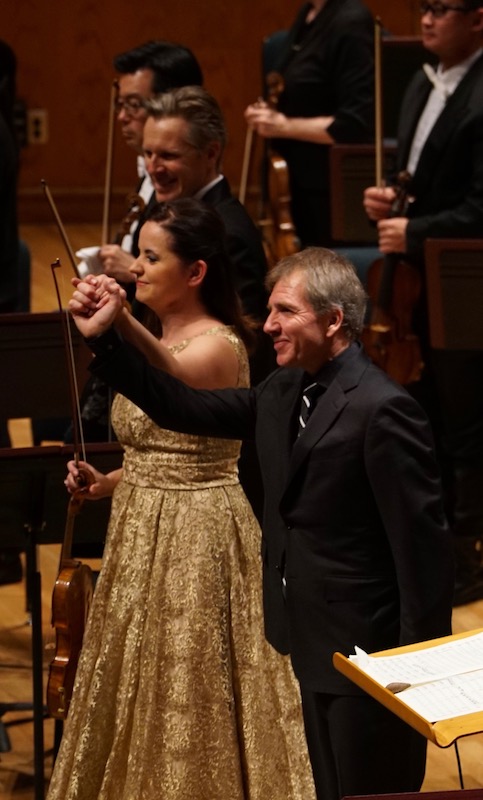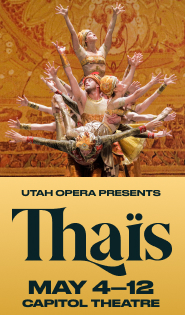Skride and Fischer are close partners in memorable Sibelius with Utah Symphony

Baibe Skride and Thierry Fischer acknowledge applause following the performance of Sibelius’s Violin Concerto with the Utah Symphony Friday night. Photo: Kathleen Sykes
Baiba Skride is one of Thierry Fischer’s favorite violinists. She has appeared on the Abravanel Hall stage numerous times since Fischer became music director of the Utah Symphony in 2009.
Skride returned to Salt Lake City Friday night to perform Jean Sibelius’ sole contribution to the concerto repertoire, his Violin Concerto in D minor.
The Latvian violinist showed why Fischer appreciates her as a collaborator. Skide has musicality in abundance, remarkable technique and a keen sense of interpretation, all of which came together in her finely crafted reading of the concerto.
“Passionate” is the word that describes the soloist’s playing in each of the three movements. The opening and closing movements were filled with dynamic power and rhythmic vitality. Skride played the cadenza of the opening Allegro with a self-assuredness that made the virtuosic passages flow effortlessly from her instrument.
In the Adagio, the 37-year-old violinist displayed her expressive side to the fullest, playing with lyricism, warmth and nuanced phrasing. Fischer and the orchestra matched her playing wonderfully, with a subtle accompaniment that allowed her to soar over the orchestra.
In the closing Allegro, Skride underscored the crisp, march-like main theme with her ebullient playing. She brought a precision and definition that was mirrored in Fischer’s lucid support. This close collaboration made for a distinctive and memorable performance of this popular work.
Fischer paired the Sibelius with selections from the incidental music to Peer Gynt by Edvard Grieg. Fischer’s readings of these familiar short pieces, that included “Morning Mood,” “Anitra’s Dance,” and “In the Hall of the Mountain King,” captured the character of each without trying to make too much novel out of them.
On the first half of the concert, Fischer once again juxtaposed a short piece by Pierre Boulez with two of J.S. Bach’s Brandenburg Concertos as he did in last month’s program. As before, these works were played without a break between them, and Fischer again divided the reduced orchestra forces into three parts, with a different lineup for each piece.
This week Fischer and the orchestra played the middle two Brandenburgs. In the Third, scored for strings and continuo, Fischer coaxed a nuanced and crisply defined performance that captured the vitality of the outer movements. Fischer’s tempi choices for the two Allegros were a bit iffy, in particular in the finale, which he took at a breakneck speed. To the players’ credit, they acquitted themselves admirably, playing with clean phrasing and finely crafted expression despite the furious tempo. The middle movement, which consists solely of two chords, was played with just the slightest of embellishments by Jason Hardink at the harpsichord.
The Fourth Concerto featured concertmaster Madeline Adkins, principal flute Mercedes Smith and associate principal flute Lisa Byrnes as soloists, all of whom played with well-honed lyricism. The slow movement was the highlight, with all three mining a strong degree of feeling. Thankfully, Fischer didn’t try to set any speed records here, and the tempos in the outer movements were more reasonable, with a much more successful overall result. The small ensemble accompanying the soloists played with crisp articulation and neatly shaped phrases.
In between the two Brandenburgs was Boulez’s Mémoriale, scored for flute and eight instruments. Boulez wrote several different arrangements of this work for various instrumental configurations, some of which included electronic sounds.
The version played Friday was one that Boulez worked on in close collaboration with Lawrence Beauregard, principal flute in the Ensemble InterContemporain. When Beauregard died suddenly, Boulez decided to turn this confection into a tribute for him.
The seven-minute-long piece is subtle in its themes and interactions between the ensemble and the flute solo, and at times it feels improvisatory, as the flute moves around the sustained tones of the ensemble.
Flutist Caitlyn Valovick Moore gave a wonderfully crafted and expressive account that underscored the extemporaneous character of her part. Her playing was well-defined and nuanced, and Fischer made sure there was a fine balance between the ensemble and soloist.
The program will be repeated 7:30 p.m. Saturday in Abravanel Hall. 801-355-2787. utahsymphony.org.

